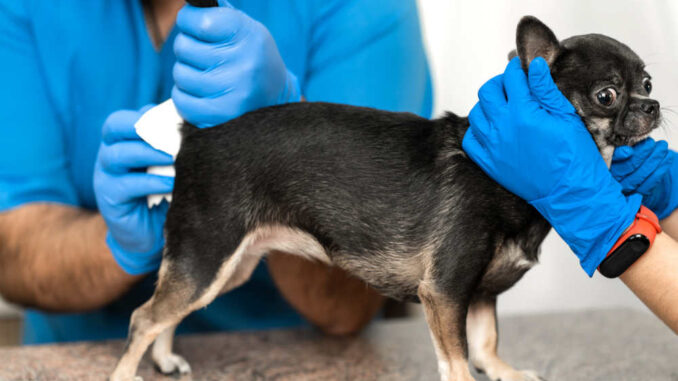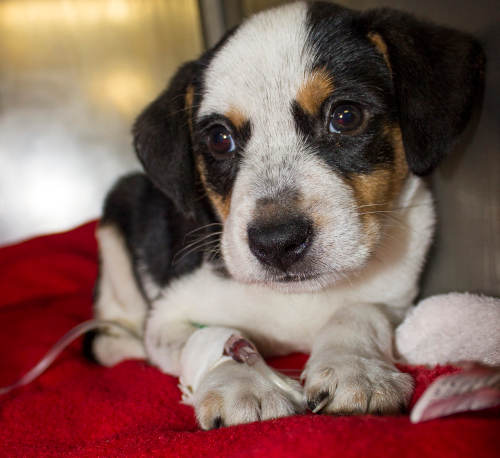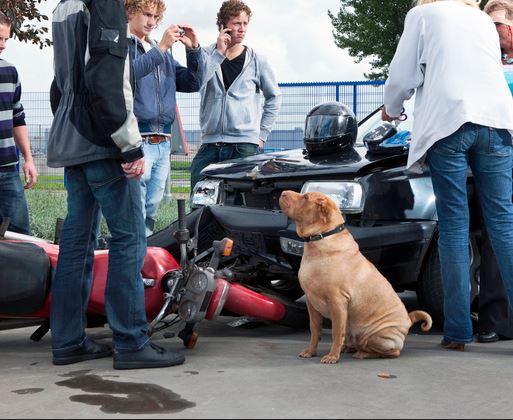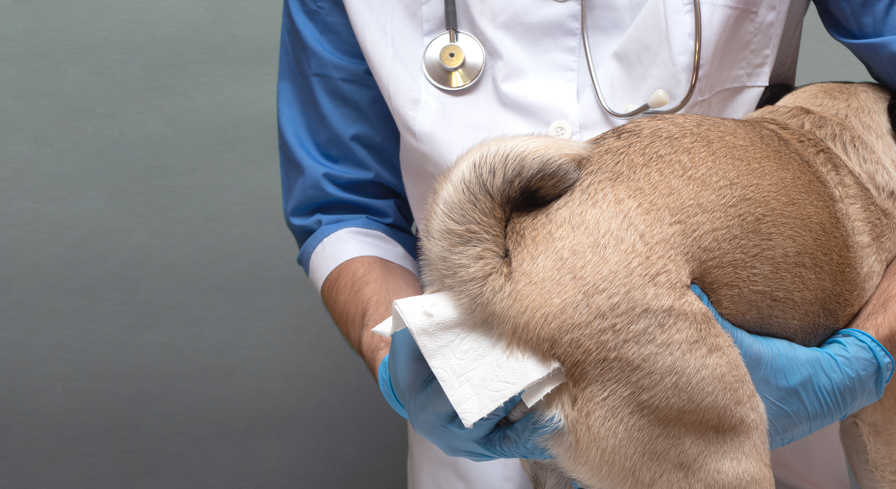
This article was updated on June 13th, 2023
Having a dog pass away suddenly and unexpectedly can be hugely traumatic and it is natural to wonder why this has happened and if the death could have been prevented. We do not always get a clear answer as to why a pet has passed, but it’s certainly worth discussing the death with their vet, to try and get to the bottom of things.
Blood coming from the anus would not be a sign that is specific to any one condition or trauma, but can be indicative of a number of causes. In my clinic, it would not be something I commonly see. Let’s take a closer look at the possibilities.
Possible causes of bleeding from the anus in dogs
Bleeding from the anus occurs in a range of situations and is not a specific sign. It is worth nothing the amount of blood and confirming it is coming from the anus, rather than a wound near the anus or the vagina.
Some of the more common causes would include:
• Gastrointestinal issues
Severe inflammation, ulcers or masses along the gastrointestinal tract can all lead to bleeding from the back end. When it is the stomach or small intestine that is bleeding, the blood tends to be dark and digested. Fresh red blood tends to originate from the large intestine, rectum or anus. Owners should seek immediate vet attention if their dog is actively bleeding from their anus, even if they seem well.
• Infections
A huge range of viral and bacterial infections can lead to anal bleeding. One of the most well-known of these is Canine Parvovirus. This disease is more commonly seen in young pups that have not been vaccinated. As well as blood from the anus, we may also see signs including vomiting, lethargy and weight loss. With prompt and aggressive treatment, up to 90% of affected patients can survive (2), but the disease can be fatal.

• Injury
Injuries like vehicle accidents and falls from a height can lead to significant internal trauma and internal bleeding. As a veterinarian, I frequently see injuries like ruptured spleens and gut lacerations after severe trauma. Even if the dog seems normal externally after a trauma, a vet check is always warranted as patients can decompensate rapidly.

• Tumors
In older dogs, tumors would be a frequent cause of unexpected bleeding coming from the anus. There can be symptoms before this bleeding, such as weight loss, vomiting and diarrhea. If the tumor starts to ulcerate or there is a large blood vessel involved with the mass which ruptures, we can see sudden and copious bleeding, which can lead to shock and even acute death.
Masses within the rectum will generally not be visible from the outside, so would be detected on a rectal exam performed by a vet. Read our articles about Bleeding Lump on a Dog’s Bum or Dog’s Red or Inflamed Anus.

• Bleeding disorders
One of the most common causes of sudden bleeding in dogs would be a toxicity such as a rat bait toxicity. This poison leads to a failure in the blood clotting system, and bleeding throughout the body. Signs are typically seen a few days after the bait is eaten and can include panting, abdominal bloating and bruising on the skin (1). When not treated, the bleeding can lead to circulatory shock and animals can pass away quickly.

How did this lead to the death of my dog?
In some cases the dog will bleed so much that there is not enough blood circulating in their body, which leads to shock, organ failure and death. In other instances, the bleeding will not be enough to cause death, but is indicative of the underlying problem (such as a severe infection or a clotting disorder).
The best way to try and get a definitive answer is to request a postmortem exam. This can usually be done, as long as the dog has passed within the last 24 hours. Most vets can do this, though some will refer to specialist centers who have pathologists, particularly if they are suspicious of an unusual cause of death.
Could my dog have survived with treatment?
Sadly, in many instances the death will not have been avoidable. This is the case when there has been severe trauma or extensive bleeding. The more sudden a death is, the less chance we could have prevented it.
Certainly, some conditions will have been treatable. An example of this is rat bait toxicity. If we know our dog has eaten rat bait, we should immediately go to the vets to induce vomiting and they can start the dog on the antidote, which is Vitamin K. With prompt treatment, the prognosis is excellent (1).
Frequently Asked Questions
• Is bleeding from the anus always a sign of something serious?
While bleeding from the anus is a red flag and something we should investigate urgently, it is not always a life-or-death situation. For example, a wart on the anus can bleed, as can an anal gland abscess. Neither of these conditions are going to cause a dog to pass away.
• Is there a link between anal gland issues and bleeding from the anus?
Absolutely, very inflamed or infected anal glands can form abscesses which might rupture and bleed. Generally, the bleeding will be coming from a tract beside the anus, rather than the anus itself.
• Can I request a necropsy (post-mortem) to determine the exact cause of death?
Yes, as long as the dog passed away recently. This is usually the best way to determine why the dog died.
1. https://vcahospitals.com/know-your-pet/rodenticide-warfarin-poisoning-in-dogs
2. https://www.avma.org/resources-tools/pet-owners/petcare/canine-parvovirus
Disclaimer: This website's content is not a substitute for veterinary care. Always consult with your veterinarian for healthcare decisions. Read More.


Be the first to comment